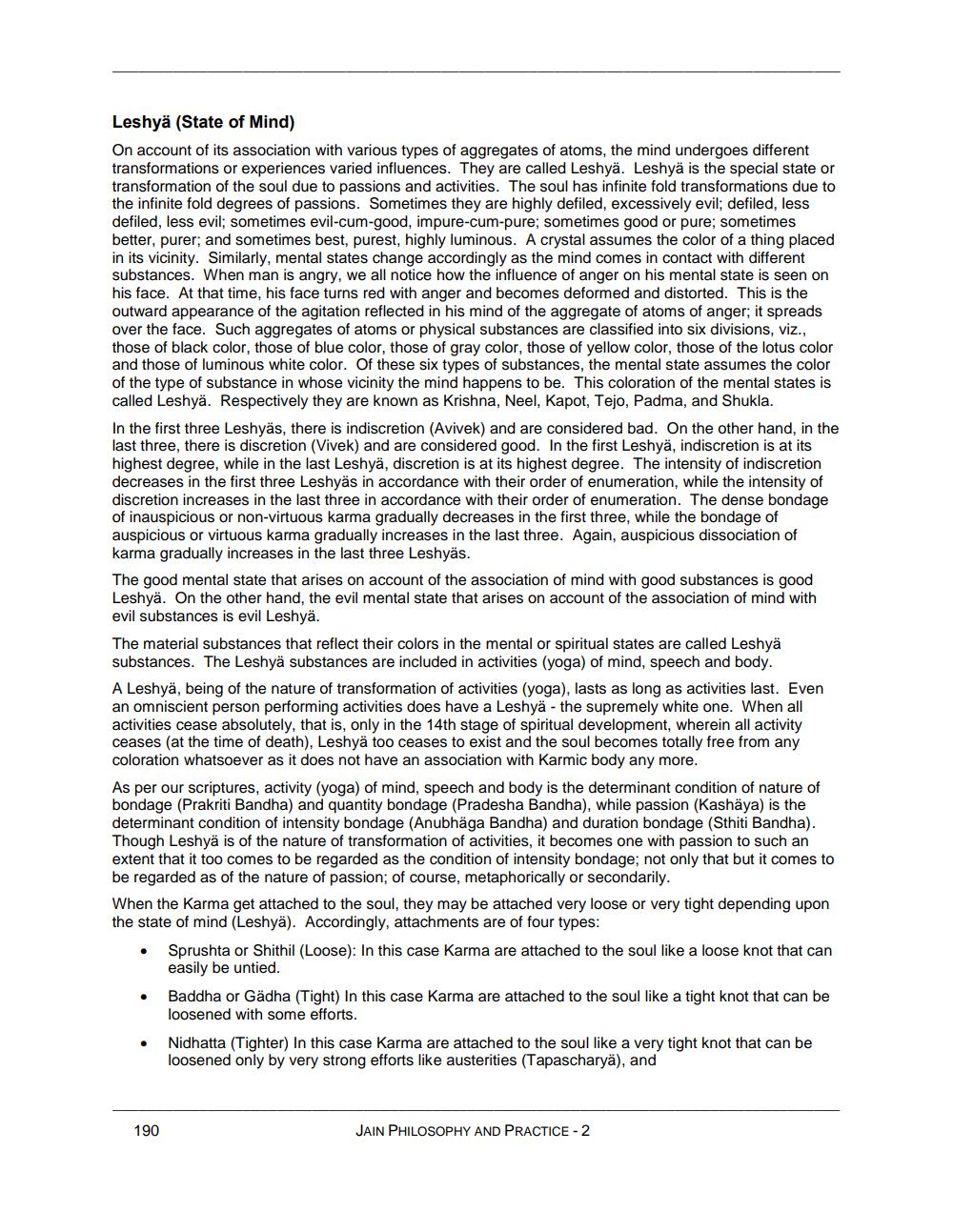________________
Leshyä (State of Mind)
On account of its association with various types of aggregates of atoms, the mind undergoes different transformations or experiences varied influences. They are called Leshyä. Leshyä is the special state or transformation of the soul due to passions and activities. The soul has infinite fold transformations due to the infinite fold degrees of passions. Sometimes they are highly defiled, excessively evil; defiled, less defiled, less evil; sometimes evil-cum-good, impure-cum-pure; sometimes good or pure; sometimes better, purer; and sometimes best, purest, highly luminous. A crystal assumes the color of a thing placed in its vicinity. Similarly, mental states change accordingly as the mind comes in contact with different substances. When man is angry, we all notice how the influence of anger on his mental state is seen on his face. At that time, his face turns red with anger and becomes deformed and distorted. This is the outward appearance of the agitation reflected in his mind of the aggregate of atoms of anger; it spreads over the face. Such aggregates of atoms or physical substances are classified into six divisions, viz., those of black color, those of blue color, those of gray color, those of yellow color, those of the lotus color and those of luminous white color. Of these six types of substances, the mental state assumes the color of the type of substance in whose vicinity the mind happens to be. This coloration of the mental states is called Leshyä. Respectively they are known as Krishna, Neel, Kapot, Tejo, Padma, and Shukla.
In the first three Leshyäs, there is indiscretion (Avivek) and are considered bad. On the other hand, in the last three, there is discretion (Vivek) and are considered good. In the first Leshyä, indiscretion is at its highest degree, while in the last Leshyä, discretion is at its highest degree. The intensity of indiscretion decreases in the first three Leshyäs in accordance with their order of enumeration, while the intensity of discretion increases in the last three in accordance with their order of enumeration. The dense bondage of inauspicious or non-virtuous karma gradually decreases in the first three, while the bondage of auspicious or virtuous karma gradually increases in the last three. Again, auspicious dissociation of karma gradually increases in the last three Leshyäs.
The good mental state that arises on account of the association of mind with good substances is good Leshyä. On the other hand, the evil mental state that arises on account of the association of mind with evil substances is evil Leshyä.
The material substances that reflect their colors in the mental or spiritual states are called Leshyä substances. The Leshyä substances are included in activities (yoga) of mind, speech and body.
A Leshyä, being of the nature of transformation of activities (yoga), lasts as long as activities last. Even an omniscient person performing activities does have a Leshyä - the supremely white one. When all activities cease absolutely, that is, only in the 14th stage of spiritual development, wherein all activity ceases (at the time of death), Leshyä too ceases to exist and the soul becomes totally free from any coloration whatsoever as it does not have an association with Karmic body any more.
As per our scriptures, activity (yoga) of mind, speech and body is the determinant condition of nature of bondage (Prakriti Bandha) and quantity bondage (Pradesha Bandha), while passion (Kashaya) is the determinant condition of intensity bondage (Anubhäga Bandha) and duration bondage (Sthiti Bandha). Though Leshyä is of the nature of transformation of activities, it becomes one with passion to such an extent that it too comes to be regarded as the condition of intensity bondage; not only that but it comes to be regarded as of the nature of passion; of course, metaphorically or secondarily.
When the Karma get attached to the soul, they may be attached very loose or very tight depending upon the state of mind (Leshyä). Accordingly, attachments are of four types:
⚫ Sprushta or Shithil (Loose): In this case Karma are attached to the soul like a loose knot that can easily be untied.
•
190
Baddha or Gädha (Tight) In this case Karma are attached to the soul like a tight knot that can be loosened with some efforts.
Nidhatta (Tighter) In this case Karma are attached to the soul like a very tight knot that can be loosened only by very strong efforts like austerities (Tapascharyä), and
JAIN PHILOSOPHY AND PRACTICE - 2




